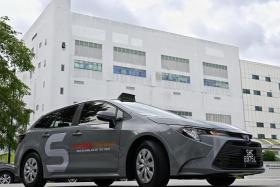Road tax for mass-market electric cars to be lowered from next year
Road tax for mass-market electric cars will be lowered to be on a par with that for similar models driven by combustion engines from next year, removing yet another hurdle to the adoption of these cleaner rides.
Speaking in Parliament yesterday, Transport Minister Ong Ye Kung noted that road tax for electric cars had already been lowered in January - by as much as 40 per cent.
But the larger mass-market electric models still incur more road tax than their petrol equivalents. To address this, Mr Ong said road taxes for e-cars in the 90-230kW power band will be adjusted further.
To do so, the Land Transport Authority will merge the current electric car road tax bands of 30-90kW and 90-230kW, and subject them to the current formula of the lower band.
"That way, we bring down the road taxes of electric cars in the upper band," Mr Ong said, noting that with the change, a Hyundai Kona Electric will see its annual road tax fall from about $1,400 to $1,100, and that of a Tesla Model 3 will drop from $2,300 to $1,500.
"This will make their road taxes comparable with internal combustion engine models with a similar look and feel," he added, noting that Singapore will provide incentives for electric car buyers until their pre-tax costs are on a par with that for combustion engine cars - which experts reckon will happen by 2025.
While some observers have pointed out that the road tax for luxury electric vehicles (EVs) are also higher than for their combustion engine models, Mr Ong said that these being "big luxurious cars... I prefer to leave them alone for now".
To sweeten the deal for mass-market buyers further, the minister said the $5,000 minimum additional registration fee (ARF, or the main car tax) will be removed from next January.
Mr Ong also announced details of the 60,000 charging points which will be built by 2030. The majority will be normal or slow chargers, as these can be rolled out without extensive and costly changes to the power grid, he said.
Some 40,000 chargers will be in public and Housing Board carparks, with the remaining 20,000 on private premises.
The Government aims to have at least eight EV-ready HDB estates by 2025, where every HDB carpark will have charging points. These are Ang Mo Kio, Bedok, Choa Chu Kang, Jurong West, Punggol, Queenstown, Sembawang and Tengah.
Get The New Paper on your phone with the free TNP app. Download from the Apple App Store or Google Play Store now

